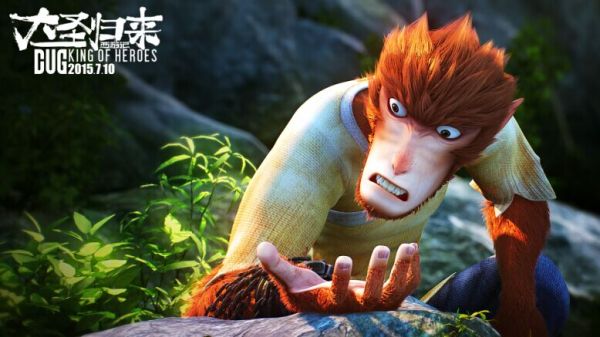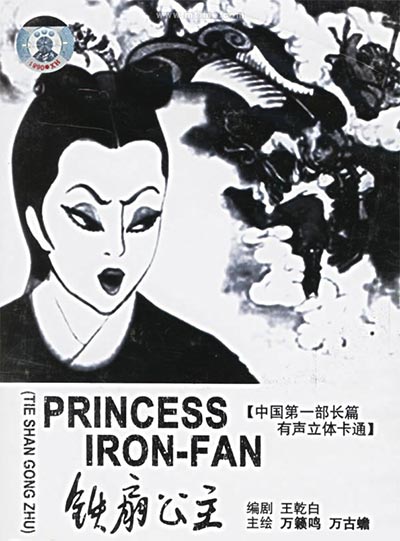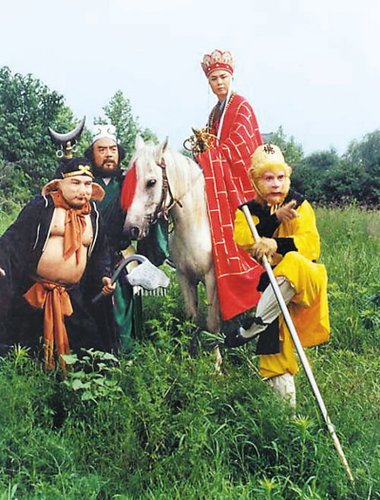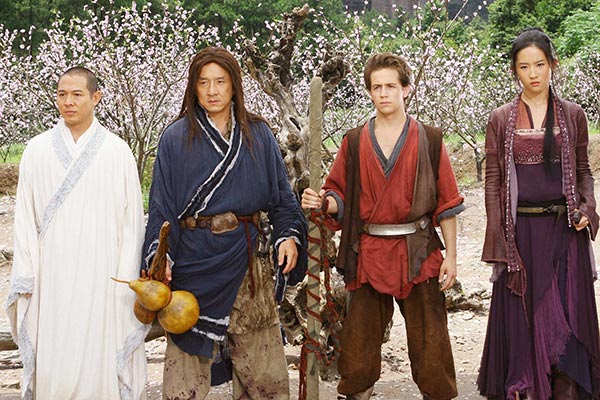
 |
|
A screen capture from Monkey King: Hero is back. [Photo/Agencies] |
Outdoors, the mercury is escalating. Indoors, China's box office is on fire.
Domestic animated feature, The Monkey King: Hero is Back, has been riding the high tide in ticket sales ever since its release on July 10.
By July 18, Monkey King had raked in 620 million yuan ($99.8 million), snatching the throne of the highest grossing animated film in Chinese cinemas, a title formerly held by Kung Fu Panda 2.
Based on China's classic epic, Journey to the West, Monkey King: Hero is Back tells the story of the once-defeated Monkey King's search for self-worth and how one bears the weight of being a hero with the help of a young and kind-hearted monk.
"Seventy-two changes" is one of the Monkey King's tricks in the original story, referring to his ability to transform into different characters in nature.
Aside from China's new star in box office revenue, the epic Journey to the West also has gone through many changes throughout history.
Here we list just a few representative works.
DVD cover of The Princess of Iron Fan. [Photo/Agencies]
The Princess of Iron Fan

Monochromatic film The Princess of Iron Fan was the first animated feature made in China. It was directed by the Wan brothers, all masters in China's history of animation. A monk and his three disciples seek Buddhist teachings, but their journey is intercepted by Huo Yanshan, a fire mountain. The Monkey King and Zhu Bajie go to borrow the fan from the Princess of Iron Fan, which can put out the fire on the mountain, but the princess refuses to lend it. After a series of fights with the princess and her husband, the Ox King, the group obtains the fan, extinguishes the fire and finally continues their journey to the west.
Director: Wan Laiming, Wan Guchan, Wan Chaochen, Wan Dihuan
Release date: 1941
 |
|
A screen capture from Uproar in Heaven. [Photo/Mtime] |
Uproar in Heaven
Produced by Shanghai Art Film Studio from 1961 to 1964 and released by French company Les Films de ma Vie, animated feature Uproar in Heaven was one of the first films China exported to the world. The film reflected the conflict and struggles between the oppressed (the Monkey King) and the oppressor ("officials" in heaven). It showed the Monkey King's bravery, optimism and willingness to resist to pressure, while at the same time mocked the intransigency, cruelty and incompetency of the Jade Emperor, the Dragon King and the officials from heaven. As a milestone in China's animation, Uproar in Heaven influenced many audiences in China with its distinctive and positive theme and deep, clear and high-spirited tone of storytelling.
Director: Wan Laiming, Tang Cheng
Release date: July 25, 1964
 |
|
A screen capture from TV series Journey to the West. [Photo/Agencies] |
Journey to the West (Televisioni series)
When asked what is the most classic representation of the original novel, most viewers in China would name the television series, Journey to the West, that was broadcast on China Central Television in 1986.
The team created a fantasy-filled mystical world with limited funding and technology, but one that strictly adhered to the storyline of the original novel. The bravery and indomitable vitality of the main characters were minutely captured, winning hearts of audiences spanning decades and age groups. In particular, the portrayal of the Monkey King by actor Liu Xiao Ling Tong, who comes from a family of actors best known for playing the Monkey King, became an exemplary formula-like classic in the minds of many Chinese viewers. The melody of the theme song, Where the Road Is, echoed with audiences not just in that generation, but in many more to come.
Director: Yang Jie
Release date: Spring Festival of 1986
Starring: Liu Xiao Ling Tong, Xu Shaohua, Ma Dehua, Yan Huaili,
 |
|
A screen capture from A Chinese Odyssey. [Photo/Agencies] |
A Chinese Odyssey
A Chinese Odyssey is a two-part fantasy comedy released in 1995. Part one was titled A Chinese Odyssey Part One: Pandora's Box and the second, A Chinese Odyssey Part Two: Cinderella. Very loosely based on Journey to the West, it centers on the life of the Monkey King and his pursuit of freedom and love. Aside from segments based on the original novel, the films also use elements of slapstick comedy and martial arts.
Though the original dialogue is in Cantonese, some of the dialogues from the series, especially those on love, have reached cult classic status among Mandarin-speaking viewers.
Director: Jeffrey Lau
Release date: Jan 21, 1995
Starring: Stephen Chow, Karen Mok, Athena Chu
 |
|
A screen capture from The Forbidden Kingdom. [Photo/Agencies] |
The Forbidden Kingdom
The story unfolds when 17-year-old Jason discovers a gold staff, or Jingu Bang (a weapon used by the Monkey King in the original novel Journey to the West), in south Boston and somehow travels in time and finds himself in a village in ancient China that is attacked by armored forces. Jason meets two kung fu masters (played by Jackie Chan and Jet Li) and starts to train under them. They embark on a journey to free the Monkey King and restore peace in their village.
Director: Rob Minkoff
Release date: April 24, 2008
Starring: Jackie Chan, Jet Li, Michael Angarano

Presented by Chinadaily.com.cn Registration Number: 10023870-7
Copyright © Ministry of Culture, P.R.China. All rights reserved